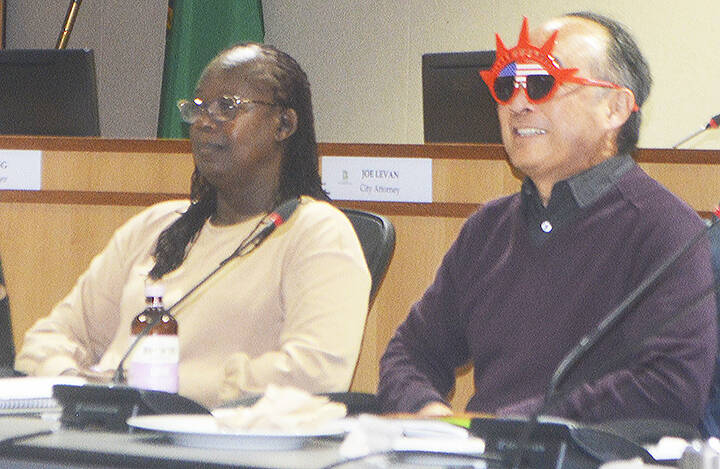It’s called a retreat, but it felt more like an advance.
The Bainbridge City Council met recently in a more informal, relaxed situation at City Hall to talk about how to work better with one another and city staff.
Moderator Marilynne Beard told council members they need to model respect to staff and community so that’s the norm.
New Councilmember Jon Quitslund said when he was on the planning commission he was told early on that they want to work toward consensus, and disagreements are discussed outside of meetings.
Beard said that was a value passed on to him. It was an expectation on how to “disagree respectfully.”
Councilmember Kirsten Hytopoulos, who has been on council seven years, said rather than honesty and transparency she has since paranoia and attacks. She said even though the council last year aligned more politically it was more dysfunctional than the one now.
Councilmember Leslie Schneider, in her fourth year, said she did not get an introduction like Quitslund did. But she said some of her most-rewarding moments have been outside-council conversations.
Another newer councilmember, Clarence Moriwaki, said, “We need to have fun together.”
Beard said that is an important element often missing on the council.
“When was the last time anyone told a joke?” Mayor Joe Deets asked. “It can break the tension.”
Hytopoulos said many on the council have felt it wasn’t a safe place for humor.
Another often missing aspect is flexibility. Ideas are often it’s my way or the highway. Beard said there might be a nugget in someone’s opposition that could be included with a little compromise. “How can we capture that?” she asked.
Hytopoulos said they could try to find that “sweet spot” to come to consensus.
Beard said you can read each other’s body language to see if they have a different perspective. “Invite them in,” she said.
For example, Councilmember Michael Pollock did not attend the event. Beard said he might “feel out of place” among the council.
Deets said as mayor it might be his job to reach out, but he had a problem with Pollock not showing up.
Deputy Mayor Brenda Fantroy-Johnson said even though they may starting talking about an issue in different places she would like them all to come together at the end.
Regarding coming to consensus, city manager Blair King said, “You don’t have to have it,” but it brings an element of trust when there is compromise and everyone is on board.
Schneider said it can be hard to modify positions a person is passionate about – such as transportation for her. “My gut is my filter,” she said, adding she wants to be challenged on issues. She said she wants to consider other opinions and listen to learn new perspectives, but people just have to be aware of other people’s filters.
“You can’t have everything all the time,” Beard said.
Hytopoulos said they need to make sure “all the voices are at the table,” not just to appease people but to really listen to input from the community.
Working with staff
Beard started the session explaining how staff has to support the vision of the council or, “We won’t get anywhere.” She said the city manager provides advice to the council, often based on staff research. She said the decision-making process needs to be defined, well-communicated, and there must be accountability.
Regarding operations and policy, “This is where is gets tricky,” she said. It’s really a Separation of Powers with council setting policy and the city manager in charge of operations. King has to be “politically savvy without being political. Being political is not a good career move” for a city manager, she added.
Asked the good and bad about staff, the council had a variety of answers.
Deets said of council, “We are not experts,” so they rely on staff for answers. However, he said sometimes memos from staff are so unclear he has to read them up to five times.
Fantroy-Johnson said she appreciates the research and gap analysis. She also likes the options and recommendations, along with memos that include background.
King said he struggles with that last part; he’s afraid too include too much.
Beard said Fantroy-Johnson appreciates that because she hasn’t been on the council as long as some others. So she said it’s good to provide links so councilmembers can get more background if they want it.
Schneider said she’s not afraid to ask the dumb questions because she doesn’t want to guess what something means. She appreciates that she can trust staff’s feedback.
Beard said when councilmembers see collaboration work elsewhere they should bring in back to the council so that they “can do it more often.”
Quitslund said he’d like staff the be more proactive, because as experts they know problems with code, so he’d like to see them bring it to the attention of the council.
Hytopoulos agreed with Quitslund that staff could share more professional insight – in the form of specifics rather than opinion.
Beard said that some staff has PTSD because their input hasn’t always been appreciated in the past.
“It hurts. It’s a hard thing to get over,” she said.



